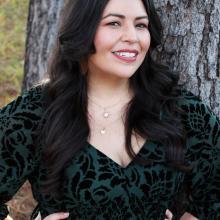How did you choose developmental science as a career?
I’ve always been interested in how people think about social groups. As an undergraduate, I participated in the McNair Scholars Program and did a summer research experience. I learned I really loved doing research. The following summer I did a summer research program at University of California, Los Angeles (UCLA) with Andrew Fuligni and learned about ethnic-racial identity. It was my first exposure to that literature and it really resonated with me given my ethnic background as a Latina and Choctaw.
Is there a mentor or mentors who have been instrumental to your career path so far, and, if so, who and how?
My mom was really my very first mentor. I remember her always being enrolled in college classes throughout my childhood. She finally completed her bachelor’s degree in 2006. She always really valued education and encouraged me to read everything and be curious.
I’ve definitely also had wonderful academic mentors as well. I already mentioned Andrew Fuligni who was influential in setting me on this track of focusing on ethnic-racial identity in my work. I worked with Adriana Umana-Taylor and Larry Dumka in graduate school and both were instrumental to my development as a scholar. They instilled the foundations of knowledge about this area of work and of research in general.
I believe that mentoring continues throughout one’s career so I try to stay involved in co-mentoring programs. At Florida State University I participated in a program for faculty of color called Connections. I hope to find a similar space here at University of Massachusetts (UMass).
What advice would you give to a prospective graduate student thinking about beginning their Ph.D. studies in the developmental science field?
I would want to remind students of any marginalized background that they belong here. They have earned it and we need their voices. The accumulation of knowledge benefits so much from a diverse research team.
I would also say that it’s important to have multiple mentors. No one can support you in all ways so you really do need a whole system of support. You might find that one mentor is amazing at supporting you professionally while another can be more supportive when it comes to social issues.
What is your best SRCD memory?
What I love most about conferences is seeing friends I haven’t seen in a long time. It’s obviously good to catch up but also so inspiring to hear what they’ve been working on and sometimes that leads to great collaborations! So another word of advice for students – you should still go to actual conference sessions, but don’t discount the importance of getting to know scholars over coffee – sometimes those are the most productive moments!
Why did you join the Latinx Caucus and how does it facilitate connection among members all year long?
I joined the Latinx Caucus because it is a supportive network. It’s a good way to connect with other Latinx scholars and it provides opportunities to get involved through supporting colleagues, students, and the community.
